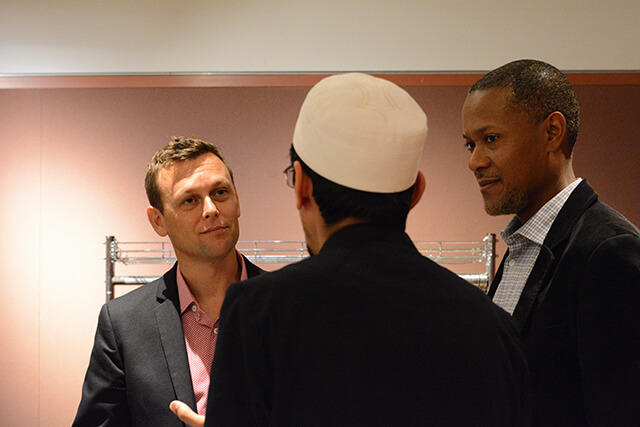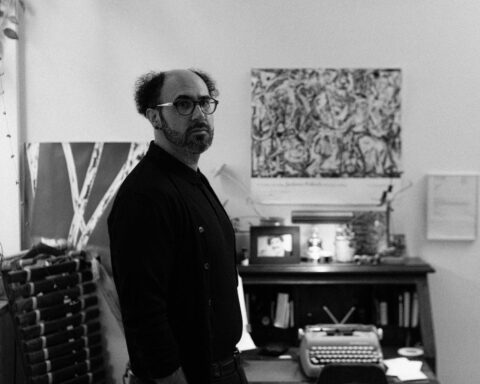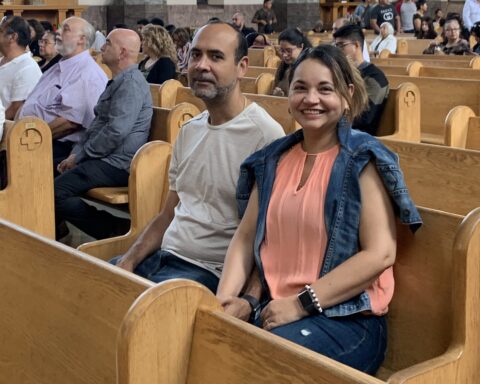Why are Canadians converting to Islam in Canada? That’s the question that Australian academic Dr. Scott Flower is trying to answer by collecting the life stories of Canadian Muslim converts.
Funding for his research has come from Canadian government agencies concerned about the number of converts to Islam involved in terrorist activities nationally and abroads recently – Martin Couture-Rouleau, who killed Warrant Officer Patrice Vincent in Quebec, Michael Zehaf-Bibeau who killed Cpl. Nathan Cirillo and then tried to storm Parliament Hill in Ottawa, and ISIS recruit John Maguire, who released a video threatening further terrorist attacks on Canadian soil.
But at a panel discussion organized by Muslim Link in Ottawa this weekend, “The Dilemmas of Studying Conversion to Islam in the Post 9/11 World”, Flower shared that national security interests are not what drives his research.
“If I’m totally honest, I would prefer to do this research without a 9/11 shadow hanging over me or in a securitized environment,” Flower explains. “My interest is really just understanding the journeys of converts to Islam, free of the national security dimension. But that’s now the reality that we live in.”
This “reality” he speaks of has left government, law enforcement and even Muslim religious leaders asking the question: Are converts to Islam more prone to radicalization?
“Governments should base their national security policies on empirical evidence and so far there is no empirical evidence to justify believing that converts to Islam pose a special security threat.”
Flower feels that question cannot be answered without a better academic understanding of the causes and processes of conversion to Islam in Canada.
“Governments should base their national security policies on empirical evidence and so far there is no empirical evidence to justify believing that converts to Islam pose a special security threat,” Flower states.
 Debunking misconceptions
Debunking misconceptions
In 2014 Flower published an initial study, “(Mis)Understanding Muslim Converts in Canada: A Critical Discussion of Muslim Converts in the Contexts of Security and Society”, funded by the Canadian Network for Research on Terrorism, Security and Society (TSAS).
Based on the life stories of 25 converts living in Ontario, the study explores how social contexts affect converts’ beliefs, experiences, attitudes and behaviours. The study concludes that there is no “conveyor belt” mechanism that leads a convert to become a terrorist.
With funds from Public Safety Canada, Flower is now carrying out this study nation-wide.
One misconception Flower wants to debunk is the assumption that converts to Islam are not well educated about the religion and therefore are more at risk of radicalization.
“Based on our research, converts spend an inordinate amount of time studying Islam before they become Muslim,” he explains. “They are not sheep. They are not the type of people who are followers. They are not the type of people who are easily led.”
Sharing research
Flower has made a troubling observation based on his initial research in Ontario – the majority of converts are not connected and do not feel welcome at their local mosques. Some of this alienation is based on race and ethnicity.
“One of the things that comes up for White converts in particular, according to our data, is that they sense a greater level of suspicion from born Muslims,” Flower states. “There is also an ethnic dimension to a lot of Canadian mosques – this is a Pakistani mosque, this is Turkish mosque – so it is hard for converts from other cultures to fit in.” Flower says this is a key research finding that Muslim Canadian institutions should be aware of.
“Imams admit that they don’t really know much about converts or how best to support them.”
Flower also wants the imams who have been connecting with him and his team from across the country to know he is opposed to the idea of them using a “checklist” to screen new converts as has been proposed by Imam Syed Soharwardy in Calgary.
“Imams admit that they don’t really know much about converts or how best to support them,” Flower shares. “Imams feel pressure, particularly from government, to be responsible for the management of converts in order to prevent them from becoming radicalized. There is no evidence to support such policies.”
Building trust
Flower and his team have also been reaching out to Canadian Muslim institutions in order to build trust and alleviate fears and suspicions about his research.
“In the current national security climate, Muslims, and particularly Muslim converts, feel closely examined, so there is a real reticence to come forward and talk to us because we are funded by Public Safety Canada,” Flower explains. After Bill C-51 was passed through the Senate, several converts who had been booked for interviews backed out.
Predicting these fears, Flower has designed his interview process to protect participants’ anonymity. Signatures are not even collected from participants so that no story can be traced back to an individual participant unless that is something they choose to disclose.
Ultimately, Flower feels that his research could actually help to combat the stigma against Canadian converts to Islam within mainstream and Muslim Canadian communities by debunking the myths about them. “But we only can do this if more converts are willing to share their stories,” he says.




